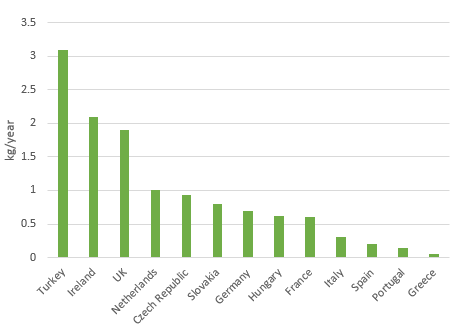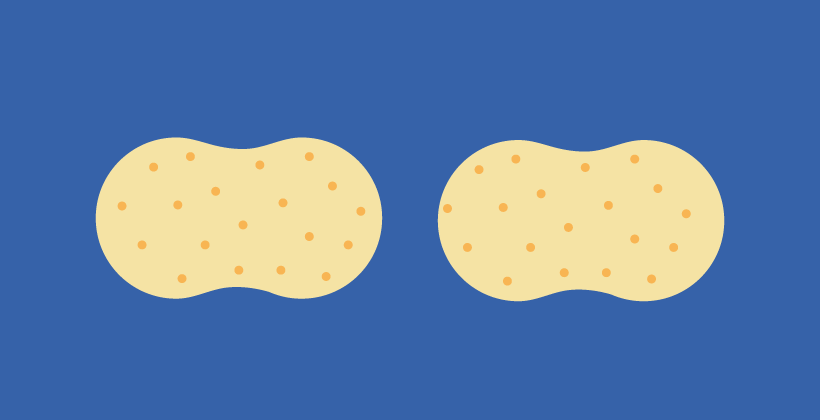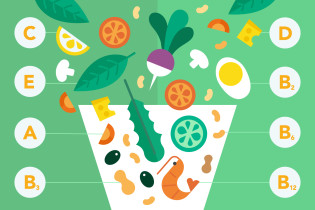Tea: Health and hydration
Last Updated : 08 October 2016Tea has been used as a refreshing drink for centuries. Tea is said to have health benefits - does the latest scientific evidence support this? Is tea a healthy source of hydration?
History and types of tea
Tea is a beverage, which has been consumed for centuries. It is the most-widely consumed drink in the world, after water.1 Figure 1 shows tea consumption per capita in some European countries.

Figure 1 - Tea consumption per capita in Europe.2
Tea is produced by adding hot water to the leaves from the tea plant, Camellia sinensis. This process is called infusion. Herbal or fruit teas, despite their name, are not strictly teas as they come from other plant species (for example, lime tree or chamomile). Different processing methods are used to produce the hundreds of varieties of tea:
- Black teas, which are most common in Europe3, are produced when tea leaves are fermented (broken down by the enzymes in the tea leaves, in a temperature controlled room) and then dried. These processes release the specific polyphenols, which produce the distinctive colour and flavour.4
- Green (unfermented) tea is produced by steaming, before drying, to minimise oxidation by enzymes - keeping the colour of the leaf, and giving its flavour characteristics.
- Oolong tea is somewhere between green and black tea in terms of fermentation and taste – its leaves are only partially oxidised.
Black and green (and oolong) teas contain different types of polyphenols, but the total polyphenol content is similar.5
Tea can be drunk as a simple infusion, or may have added milk or lemon, or sugar. However, more research is needed to understand to what degree and through which mechanisms this affects the bioavailability of the different polyphenols.
Is tea good for health?
There is much more research published on green tea than black (and other) teas. A recent exhaustive review looking into associations between food and beverage groups and diet-related chronic diseases, reported that tea was the most protective of all of the commonly consumed beverages; people reporting the highest intake of tea was associated with significantly reduced risk of type 2 diabetes (by 16%), cardiovascular disease (by 28%) and cancers (by 34%), although other studies have not shown clear relationships between tea and cancers.6 Another large study reported each additional daily cup of tea resulted in an associated 9% lower all-cause mortality.7 Many of the proposed benefits have been attributed to the presence of specific polyphenols called flavonoids having a beneficial effect on blood vessels, due to their antioxidant and anti-inflammatory properties, but caffeine and fluoride have also been suggested as important.3,5
Major studies on tea and cardiovascular disease have reported that black and green tea consumption was associated with significantly lower levels in LDL-cholesterol, blood pressure and risk of stroke.8
Regarding weight management, two recent trials reported that increased black tea consumption produced a small but significant reduction in weight, when people followed their normal diet.9,10 A previous review of 18 studies did not find a significant effect of drinking green tea on weight.11 Thus, the relationship between weight management and tea consumption remains open to debate.
Tea flavonoids may be protective against dental caries, with suggested mechanisms including antiviral and antimicrobial effects.8 Furthermore, tea provides fluoride, which promotes dental health as it improves resistance to decay.12 Nevertheless, good general dental care is the most important for proper dental health.
Caffeine in tea and how much to drink
The brewing time largely dictates the amount of caffeine in tea, and it can vary from 1 to 90 mg per 100 ml.8 While herbal or fruit ‘teas’ do not normally contain caffeine. Studies have shown that a moderate intake of caffeine can be beneficial in physical endurance and alertness; on the other hand, excessive caffeine can affect sleep.13,14 Another known effect of caffeine is its ability to act as a mild diuretic (causing the body to lose water), but studies show that this is only of concern with very high doses of caffeine. For example, drinking 6-8 cups of tea does not adversely affect hydration.15
A recent EFSA report16 concluded that healthy adults may safely consume single doses of caffeine up to 200 mg; the main guidelines are shown in Table 1, suggesting up to 8 cups of tea per day is safe for non-pregnant adults. Children over 24 months may safely drink 1-2 cups of unsweetened tea. Despite concerns over the impact of tea polyphenols on bioavailability of iron, reports have concluded that consumption of tea has little effect on iron status in adults or children.17 The British Dietetic Association recognises that tea helps towards fluid intake, and in some countries, such as Germany, tea is explicitly recommended for hydration.18
Table 1 - Safe caffeine intakes and equivalent tea intake.16
|
|
Safe daily caffeine intake |
Equivalent cups of tea (based on 50 mg caffeine per 190 ml cup) |
|
Adults |
400 mg |
8 cups |
|
Pregnant and Breastfeeding women |
200 mg |
4 cups |
|
Children |
3 mg/kg of body weight |
1-2 cups depending on age |
Conclusion
Tea is a beverage, which is enjoyed across Europe and up to eight cups of tea per day can be enjoyed within current caffeine guidelines for non-pregnant adults. Tea has unique health properties not found in other beverages owing to its high flavonoid content and is an excellent source of hydration.
Related references
References
- Hodgson JM & Croft KD (2010). Tea flavonoids and cardiovascular health. Molecular Aspects of Medicine 31:495–502.
- Europmonitor, World Bank. (Cited by Quartz, 2014)
- Siddiqui IA, et al. (2004). Antioxidants of the beverage tea in promotion of human health. Antioxidants &Redox Signaling 6:571–582.
- British Nutrition Foundation (2003). Plants: Diet and Health. (ed G. Goldberg) Oxford: Blackwell Publishing.
- Stangl V, et al. (2006). The role of tea and tea flavonoids in cardiovascular health. Molecular Nutrition & Food Research 50:218–28.
- Fardet A & Boirie Y (2014). Associations between food and beverage groups and major diet-related chronic diseases: an exhaustive review of pooled/meta-analyses and systematic reviews. Nutrition Reviews 72(12):741–762.
- Gardener H, et al. (2013). Coffee and tea consumption are inversely associated with mortality in a multiethnic urban population. Journal of Nutrition 143:1299-1308.
- Ruxton C, Phillips F & Bond T (2015). Is tea a healthy source of hydration? Nutrition Bulletin 40(3):166-176.
- Bohn SK, et al. (2014). Effects of black tea on body composition and metabolic outcomes related to cardiovascular disease risk: A randomised controlled trial. Food Function 5:1613-1620.
- Li Y, et al. (2015). Effects of tea or tea extracts on metabolic profile in patients with type 2 diabetes mellitus: a meta-analysis of ten randomised controlled trials. Diabetes Metabolism Research and Reviews. Doi 10.1002/dmrr2641.epub.
- Jurgens TM et al. (2012). Green tea for weight loss and weight maintenance in overweight or obese adults. Cochrane Database of Systematic Reviews 12:CD008650.
- European Food Safety Agency (EFSA) (2013). Scientific Opinion on Dietary Reference Values for Fluoride. EFSA Journal 11(8):3332.
- Einöther SJ & Martens VE (2013). Acute effects of tea consumption on attention and mood. American Journal of Clinical Nutrition 98(6):1700S–1708S.
- Killer S, Blannin AK & Jeukendrup AE (2014). No evidence of dehydration with moderate daily coffee intake: a counterbalanced cross-over study in a free-living population. PLoS One 9(1):e84154.
- Ruxton CH & Hart VA (2011). Black tea is not significantly different from water in the maintenance of normal hydration in human subjects: results from a randomised controlled trial. British Journal of Nutrition 106(4):588-595.
- European Food Safety Agency (EFSA) (2015). Scientific Opinion on the safety of caffeine.
- Scientific Advisory Committee on Nutrition (SACN) (2010). Iron and health. London: The Stationery Office.
- Blumberg JB (2013). Introduction to the proceedings of the Fifth International Scientific Symposium on Tea and Human Health. American Journal of Clinical Nutrition. 98(6):1607S-1610S.



